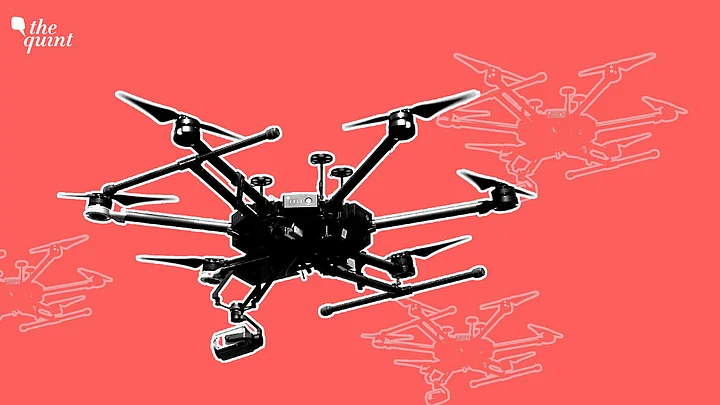The Ministry of Civil Aviation (MoCA) on Thursday, 26 August, published the new national drone policy following up from the draft policy released earlier this summer.
Based on the feedback, the government has decided to repeal the UAS Rules, 2021, and replace them with the liberalised Drone Rules, 2021.
The Drone Rules, 2021, make it significantly easier for people and companies in the country to own and operate drones. Here's all you need to know about the Drone Rules, 2021:
Key Features of Drone Rules 2021
Several approvals abolished: unique authorisation number, unique prototype identification number, certificate of manufacturing and airworthiness, certificate of conformance, certificate of maintenance, import clearance, acceptance of existing drones, operator permit, authorisation of R&D organisation, student remote pilot licence, remote pilot instructor authorisation, drone port authorisation, etc.
Number of forms reduced from 25 to 5.
The fee for a remote pilot licence has been reduced from Rs 3,000 (for large drones) to Rs 100 for all categories of drones; and is valid for 10 years.
Digital Sky platform shall be developed as a user-friendly single-window system. There will be minimal human interface and most permissions will be self-generated.
Interactive airspace map with green, yellow, and red zones shall be displayed on the Digital Sky platform within 30 days of publication of these rules.
No permission required for operating drones in green zones. Green zone means the airspace up to a vertical distance of 400 feet, or 120 metres, that has not been designated as a red or yellow zone in the airspace map; and the airspace up to a vertical distance of 200 feet or 60 metres above the area located between a lateral distance of 8 and 12 kilometres from the perimeter of an operational airport.
Yellow zone reduced from 45 km to 12 km from the airport perimeter.
No remote pilot licence required for micro drones (for non-commercial use) and nano drones.
No requirement of security clearance before issuance of any registration or licence.
No requirement of Type Certificate, unique identification number and remote pilot licence by R&D entities operating drones in own or rented premises, located in a green zone.
No restriction on foreign ownership in Indian drone companies.
Import of drones to be regulated by DGFT.
Requirement of import clearance from DGCA abolished.
Coverage of drones under Drone Rules, 2021 increased from 300 kg to 500 kg. This will cover drone taxis also.
DGCA shall prescribe drone training requirements, oversee drone schools and provide pilot licences online.
Remote pilot licence to be issued by DGCA within 15 days of pilot receiving the remote pilot certificate from the authorised drone school through the digital sky platform.
Testing of drones for issuance of Type Certificate to be carried out by Quality Council of India or authorised testing entities.
Type Certificate required only when a drone is to be operated in India. Importing and manufacturing drones purely for exports are exempt from type certification and unique identification number.
Nano and model drones (made for research or recreation purposes) are exempt from type certification.
Manufacturers and importers may generate their drones’ unique identification number on the digital sky platform through the self-certification route.
Drones present in India on or before 30 Nov 2021 will be issued a unique identification number through the Digital Sky platform provided, they have a DAN, a GST-paid invoice and are part of the list of DGCA-approved drones.
Standard operating procedures (SOP) and training procedure manuals (TPM) will be prescribed by DGCA on the digital sky platform for self-monitoring by users. No approvals required unless there is a significant departure from the prescribed procedures.
Maximum penalty for violations reduced to Rs 1 lakh.
Safety and security features like ‘No Permission, No Takeoff’ (NPNT), real-time tracking beacon, geo-fencing, etc to be notified in future. A six-month lead period will be provided to the industry for compliance.
Drone corridors will be developed for cargo deliveries.
(At The Quint, we question everything. Play an active role in shaping our journalism by becoming a member today.)
